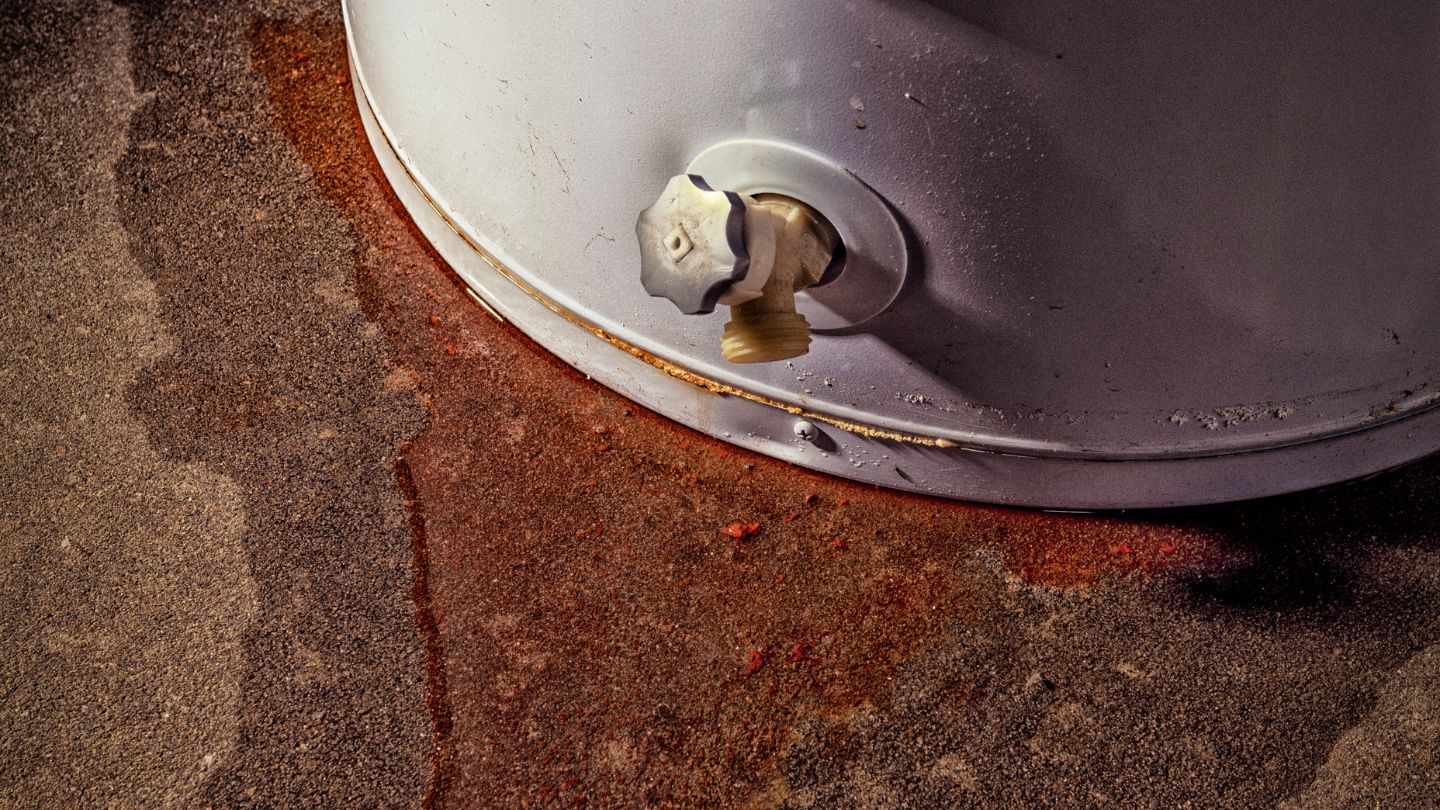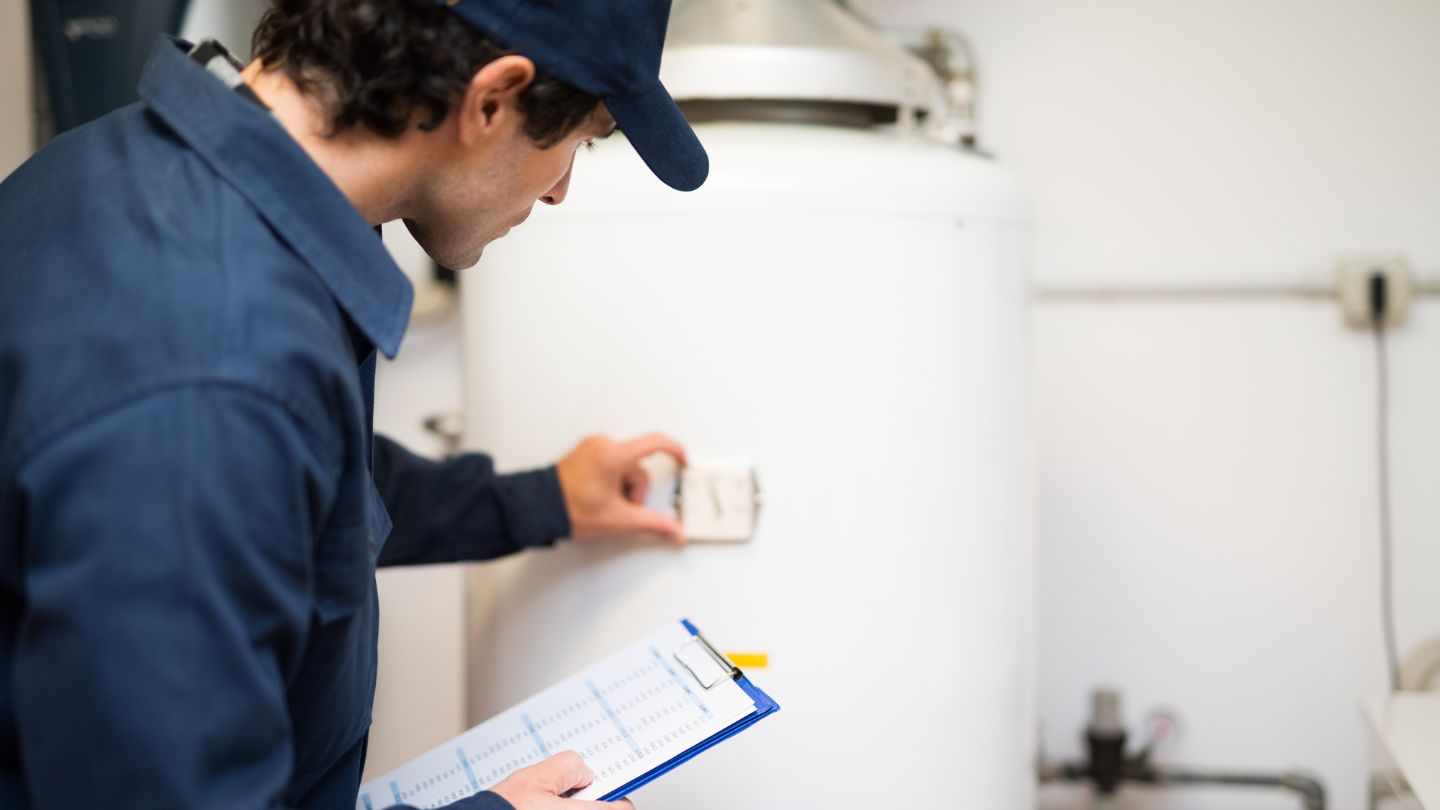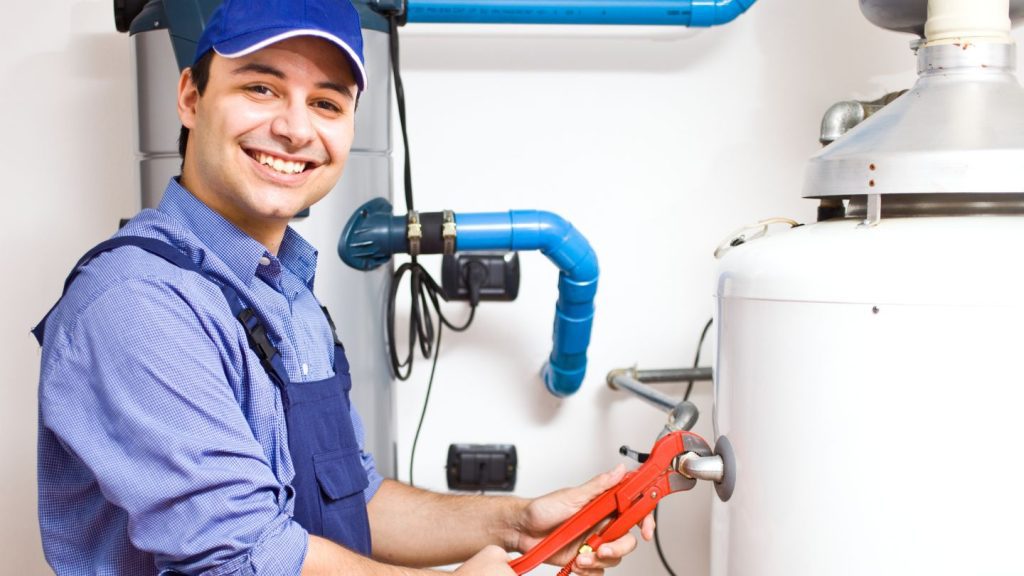Understanding the signs of water heater failure is essential for maintaining a reliable hot water supply and preventing unexpected disruptions. This guide will help you recognize the early warning signs so you can prevent water damage in your home, and take appropriate action to address any issues.
1. Water Heater Temperature Fluctuations and Noises
A common first sign of water heater trouble is inconsistent water temperature. If you’re finding that your showers are unpredictably hot or cold, or if there’s a significant delay in heating, the heating elements might be failing, or there could be a buildup of sediment affecting the heater’s efficiency. Another telltale sign is noise. As water heaters age, sediment can accumulate at the bottom of the tank. When the sediment is heated and reheated, it hardens, leading to banging or rumbling noises. These sounds are not just annoying; they signify that your water heater is working inefficiently and may be on the brink of failure.

2. Leaking and Rusty Water Heaters
Water pooling around the base of your water heater or visible signs of leakage should raise immediate concern. Leaks can lead to significant water damage over time and are often a sign that an internal component has failed or the tank itself is corroded. Similarly, if you notice rusty water coming from your hot water taps, this could indicate that the inside of your tank is rusting, a problem that usually means the water heater will need to be replaced soon. Rust can not only cause leaks but also contaminate your water supply, posing a health risk.
3. Age-Related Wear and Tear on Your Water Heater
The average lifespan of a water heater is between 8-12 years. As your unit ages, it’s more prone to issues such as inefficiency, part failures, and leaks. Regular maintenance can extend the life of your heater, but if you’re frequently calling for repairs or notice that it’s not performing as well as it used to, it might be more cost-effective in the long run to replace an old unit rather than continually fixing it.
4. Water Heater Pressure and Quality Issues
Low water pressure or changes in water quality are often overlooked as signs of water heater failure. Sediment buildup can restrict water flow and decrease pressure, affecting your entire hot water system. If you notice cloudy water or an unusual taste or smell, this might be due to mineral deposits from hard water. These sediments can also reduce your water heater’s efficiency and capacity, leading to higher energy bills and inadequate hot water supply.
5. Preventive Water Heater Maintenance and Inspection
To avoid the inconvenience of sudden water heater failure, incorporate regular maintenance and inspections into your home care routine. An annual inspection by a professional can identify potential issues before they become major problems. Tasks such as flushing the tank to remove sediment, checking the anode rod, and ensuring all components are functioning correctly can significantly prolong the life of your water heater.
6. Knowing When You Have Signs of Water Heater Failure
Recognizing whether to repair or replace your water heater depends on several factors, including the age of the unit, the nature of the problems, and the cost of repairs. A professional can help you assess the condition of your water heater and recommend the most cost-effective solution. Generally, if your water heater is close to the end of its expected lifespan and is experiencing significant or recurrent problems, replacement might be the more prudent choice.
7. Professional Water Heater Consultation and Services
Sometimes, diagnosing and fixing water heater problems can be complex and potentially dangerous if not done correctly. For any significant concerns or if you’re unsure about the condition of your water heater, seeking professional advice is the safest route. Experts can provide comprehensive services, from routine maintenance to emergency repairs and replacement, ensuring that your water heater is functioning safely and efficiently.
How Can You Tell If a Water Heater Is Going Bad?
Identifying the signs of water heater failure can save you from unexpected breakdowns. Here are signs to watch for:
- Inconsistent Hot Water Supply: If you’re experiencing hot water that unpredictably turns cold, the water heater may be struggling to maintain temperature due to failing components or sediment buildup.
- Strange Noises: Sounds like rumbling or banging from the heater suggest sediment has accumulated and hardened, which can overwork the unit and lead to inefficiency and potential failure.
- Murky or Rust-Colored Water: Discolored hot water often points to rust inside the tank, indicating corrosion that can lead to leaks.
- Leaks Around the Base: Any moisture or pooling water around the heater is a sign of a leak, potentially from micro-fractures in the tank that can expand and cause a rupture.

What Are the Signs That a Water Heater Needs Replacing?
Certain symptoms suggest that a water heater is beyond repair and needs replacement:
- Age: Most water heaters have a lifespan of about 8-12 years. If yours is in this age range and experiencing issues, replacement may be the most economical choice.
- Frequent Repairs: If you’re repeatedly fixing the heater, it’s likely more cost-effective to invest in a new, more efficient model.
- Significant Leaking: A substantial leak typically means the tank itself has failed, which requires replacement of the unit.
- Severe Water Quality Issues: Persistent problems with water clarity or taste despite repairs can indicate irreversible tank damage.
How Do I Know If My Water Heater Is End of Life?
A water heater may be considered at the end of its useful life when:
- It Reaches the Expected Lifespan: Beyond 10-12 years, even without major issues, the heater is likely less efficient and may fail soon.
- It Requires Major Repairs: When faced with the cost of significant repairs, such as a failed heating element or a corroded tank, it’s often better to replace the unit.
- Energy Bills Increase: An older heater that’s working harder to heat water can significantly increase your energy bills.
- You Notice Decreased Performance: If hot water takes longer to recover after use or the temperature isn’t as hot as it used to be, the system is likely wearing out.
What Is the Life Expectancy of a Water Heater?
The life expectancy of a water heater depends on several factors, including:
- Type of Water Heater: Traditional tank water heaters typically last 8-12 years, while tankless models can last up to 20 years with proper maintenance.
- Quality of Installation: Proper installation by a professional can extend the life of a water heater.
- Maintenance Routine: Regular maintenance, including annual flushing of the tank and checking the anode rod, can significantly prolong a heater’s lifespan.
- Water Quality: Hard water can reduce a water heater’s lifespan due to increased sediment and mineral build-up, while softened water can increase corrosion.
Call UWRG When You Have Signs of Water Heater Failure
A well-maintained water heater is crucial for comfort and convenience in your home. By staying aware of the signs of failure and taking timely action, you can ensure a continuous supply of hot water and avoid the disruption and expense of unexpected repairs.
Whether you need advice, maintenance, or a new installation, United Water Restoration Group is here to provide expert services tailored to your water damage needs. Give our expert water damage restoration team a call at 800-430-5838 for immediate assistance!





